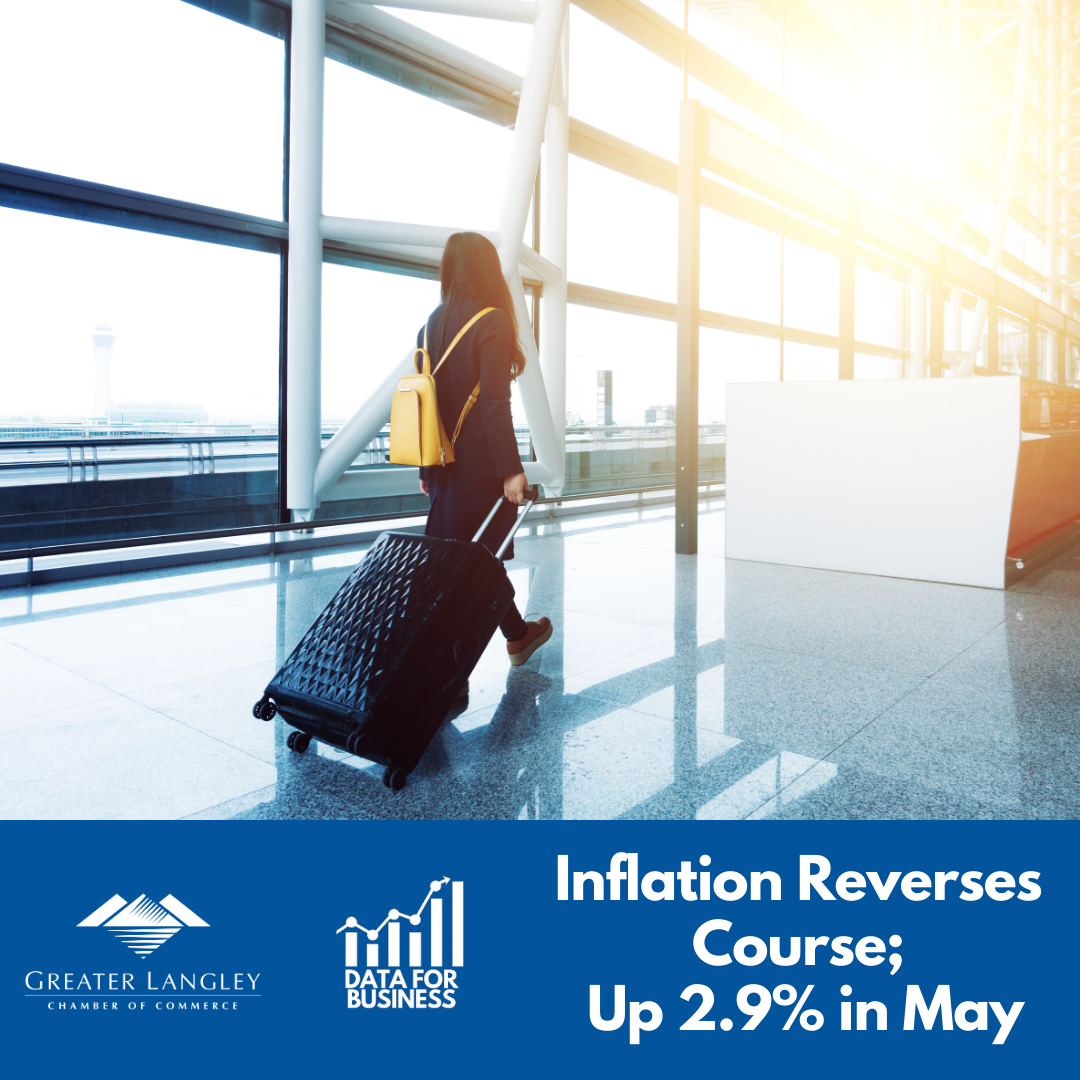Data for Business: Inflation Reverses Course - Canada’s headline CPI inflation accelerated 2.9% in May
Data for Business: Inflation Reverses Course - Canada’s headline CPI inflation accelerated 2.9% in May

‘Data for Business’ is an effort of the Langley Chamber, in partnership with the Canadian Chamber, to bring our member reports, stats, and analysis on economic and business data to help inform business and investment decisions. Read our latest update below:
Headlines:
The Consumer Price Index rose 2.9% on a year-over-year basis in May, coming very close to rising above the Bank of Canada's target range for inflation. Higher prices for services was a driving factor, with costs for cell phones, travel, rent, and air transportation all accelerating. That said, the main contributors to inflation remain mortgage interest costs , rent, insurance and gasoline. In BC specifically, the CPI came in at 2.9% -- the same as the Canadian average.
Of note, grocery prices role 1.5% year-over-year, up from 1.4% in April. This acceleration in price increases is the first since June 2023, when the inflation rate for groceries started to decline. Interesting, Statistics Canada reports that prices for groceries have increased 22.5% since May 2020. Restaurant food prices continue to slow from 4.3% in April to 4.2% in May.
Wage growth reported in the Labour Force Survey (LFS) remains slightly above 5% and is likely to keep services inflation higher in the context of a still loosening labour market.
Interest Rate Implications:
May CPI was consistent with the inflation forecast in the Bank of Canada’s April Monetary Policy Report, which expected 2.9% year-over-year growth. Despite the fact that the Bank’s policy remain overly restrictive and risks further weakening the economy, May’s inflation data will continue to give the Bank breathing room. There is more progress to achieve with bringing inflation down, anchoring inflation expectations, and slowing wage growth. Even though Governing Council recognizes that their policy is restrictive, and the economy is in excess supply, the inflation is too high.
Markets are lessening their expectations of a rate cut in July with the probably decreasing from 60% down to 40%. The strength of the Canadian economy in the second half of this year is still uncertain with population growth expected to slow and mortgage renewals continuing. Unless there are negative surprises in the next few data points for CPI and GDP, the Bank will likely keep rates at current levels in July.
Commentary:
"Not the best news on the Canadian front this morning. Governor Macklem may want to hold off on the soft-landing claim, at least for now as the Bank will likely wait to see how the economy progresses and pause at their next meeting. The increase in services inflation is not helpful, especially as wage growth is elevated. The risk of a strong rebound in the housing market hasn’t materialized yet, but slowing shelter inflation is welcome news. Our consumer spending tracker is showing growth presenting a risk that demand is more robust. Odds of a cut in July are lower and still depend on whether the economy is weaker than the Bank’s recent forecast. Governing Council continues to be heavily data dependent, and this reversal will support their restrictive bias. The Bank will want to take a slow and measured approach, especially with inflation accelerating. This bumpy road on inflation could keep the Bank overly restrictive for the Canadian economy risking any soft-landing."
- Andrew DiCapua, Senior Economist, Canadian Chamber of Commerce

